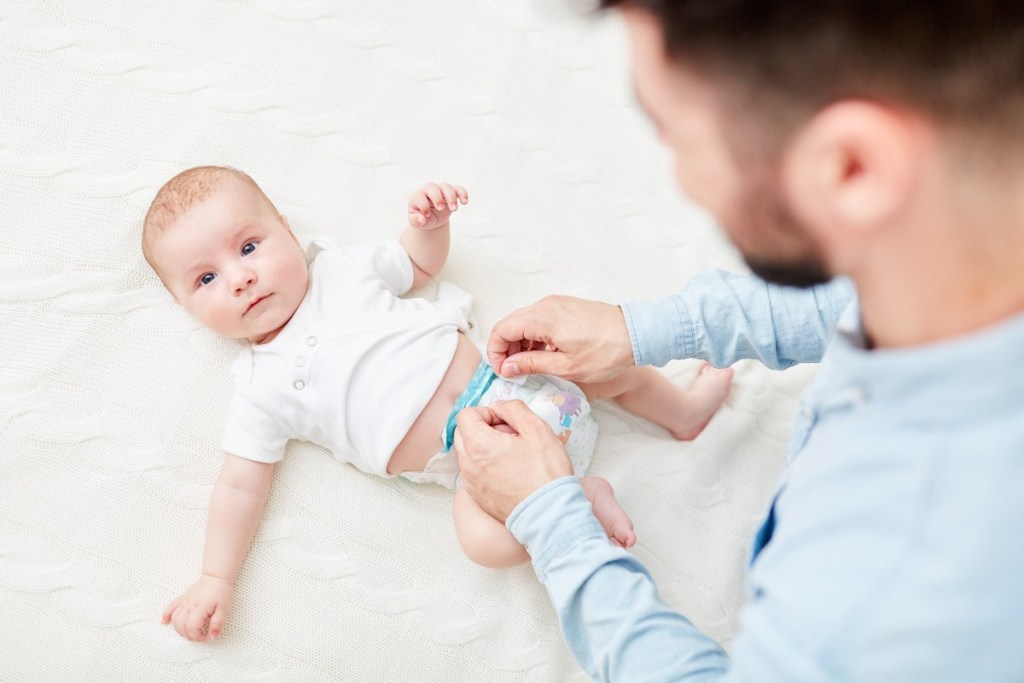Becoming a dad is a rewarding, life-changing experience, and can also be scary and overwhelming. Every dad’s experience will be different because every baby is different, every family is different, and every person is different. There is no way for your buddy to give you advice that worked for him and guarantee it will fit your needs. However, our tips for new dads are broad enough to work for you and also unique enough that you may not have thought of them before, especially if your brain is foggy from sleep deprivation.
Becoming a new dad is a huge adventure, and these tips will help you handle it with more confidence and calm.

What should new dads know?
Parental leave is not a vacation
People at work or characters in movies often give the impression that time at home (without logging onto the computer) is time off. In truth, taking care of a newborn, even with two people, is a full-time job.
Newborn babies eat every 2 hours or less and feedings can take 30 minutes or more. They need diaper changes after almost every feeding; upwards of a dozen changes per day. Getting babies to fall asleep and stay asleep can be two of the hardest jobs. There is also burping, outfit changes, nail trimming, bathing, buying more diapers, throwing out diapers, cleaning up spit-up, and other little tasks that add up as well. While babies technically spend most of their time sleeping, it’s in such short bouts that it often isn’t long enough for adults to fall asleep and enter deep sleep. You and your partner might sleep in shifts, but most first-time parents think of a 4-hour stretch of sleep as a luxury. Babies also need to be taken in for pediatrician appointments multiple times in the first few weeks of life to be weighed and checked.
Everything changes quickly
Now that we’ve thoroughly freaked you out, this is the part where we tell you not to worry. What we just described above is very temporary. The early weeks will be a wild blur of poop and spit-up and lack of sleep, but it will quickly calm down. You will also adjust more quickly and easily than you thought you would or could. Your body will adapt to your new sleep schedule, and you and your partner will come up with new routines. Once you know your baby’s health and patterns, you’ll settle in.
It’s time to push yourself
No matter how hard it is for you, it can be harder if your partner is recovering from giving birth. She needs to rest more than ever and no matter how tired you feel, you should push yourself to get up and take charge of childcare whenever it is possible. Keep reminding yourself this is temporary and lean on your own support network through texting friends, family, and other dads.
Dads can get postpartum depression and anxiety
At the same time, while you aren’t physically recovering like your partner, you are mentally recovering, too. Between 2 and 25% of dads experience paternal postpartum depression during their partner’s pregnancy or in the first year postpartum. The adjustment to parenthood is a huge life shift and can be tough on anyone. Seeking therapy can help.

How do I prepare to be a first-time dad?
Don’t drink through pregnancy
Get into the mindset of being on a team with your partner: if your partner is carrying your baby, learn what it’s like for her throughout pregnancy in whatever ways you can, like not being able to drink alcohol. By the time she gives birth, you’ll already be on the same wavelength of not only sympathizing with her but really being in it with her.
Learn how to change a diaper
There are some practical things you can learn ahead of time to prepare, like how to change a diaper. Watch a YouTube video and put a diaper on a stuffed animal. This may seem simple but it can help you feel more ready.
Write down your goals for fatherhood
Why did you decide to become a dad at all? What are all of the things you’re looking forward to, not just in the baby stage but throughout your child’s entire life? You can look at this list when you’re feeling exhausted, using it for motivation to keep your eyes open as you keep rocking and singing.
Communicate with your partner
What are her or his expectations of you? How do you plan to split overnights? How long will you take off of work? Is she planning on breastfeeding and pumping for you to bottle-feed? Do you want visitors in the first two weeks? Get on the same page as much as you can before the baby arrives.
Tips for new dads: It’ll be alright
Keeping your calm and taking the long view are two of the most important overall tips for new dads. Take it one hour at a time and you’ll make it through the newborn phase before you know it. Enjoy the sweet moments while you’re there!



